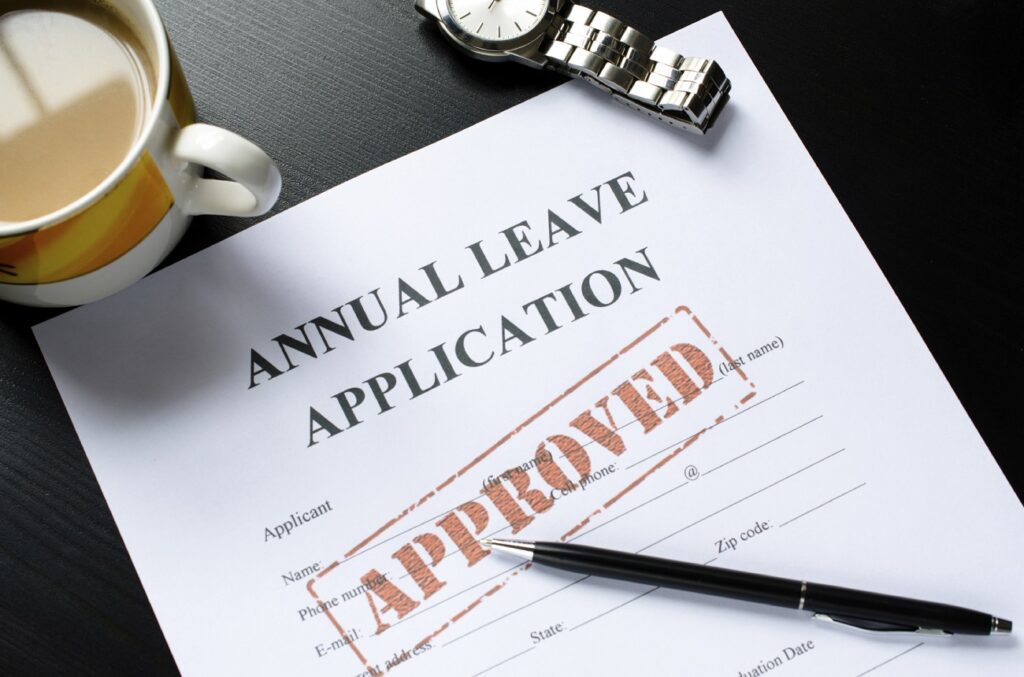Every worker is entitled a period of paid annual leave under the Working Time Regulations 1998. Annual leave starts to accrue from the beginning of the employment contract and continues to accrue throughout its duration. Even employees working their notice period continue to accumulate their annual leave entitlement.
Statutory entitlement
The statutory holiday entitlement for all employees working full time is 5.6 weeks per year, which calculates as 28 days for someone who works five days a week. The annual entitlement to 5.6 weeks can include the (usually) eight bank holidays every year in the UK.
Despite this, there is a statutory limit of 28 days imposed on leave entitlement so a worker employed on a 6 day week does not get annual leave in excess of the 28 days. Annual leave entitlement for part time workers is determined on a pro rata basis so that they accrue their entitlement according to a proportionate reduction in comparison to a full time worker.
If a new employee commences their employment at any other time except the start of the year, then they will only be entitled to annual leave, for that leave year, in proportion with the period of the year left.
How does an employee’s annual leave accumulate?
Annual leave accrues at the rate of 1/12th of the total yearly entitlement per month, and during the first year of employment, the amount of annual leave that an employee may take at any time is limited to the amount that has accrued at the time they want to take it, minus any already taken.
Annual leave accrues during the entirety of time that the contract is in place for and this includes periods of time away from work. Periods of maternity, paternity, adoption or shared parental leave to not disturb the accrual of holiday entitlement.
Likewise, European case law has established that being away from work on sickness absence will not prevent the employee from accruing their leave. This can mean, therefore, that even though an employee has been away from work for an entire year because of an illness, their right to the years’ worth of annual leave is maintained.
Can employees carry over annual leave?
Employees must take at least four weeks of statutory leave during the year. Upon the employer’s discretion, employees may be able to carry over any remaining holidays, but may only carry over anything in excess of four weeks. For example, if an employee receives 28 days holiday, they may be able to carry over eight days to the next holiday year.
There are specific rules, however, on the carrying over of annual leave to subsequent leave years in this circumstance which limits the employee from building up several weeks of annual leave where they have been off sick for a number of years.
In certain absence situations, like sabbaticals, the employer and employee can agree that annual leave will not continue to accrue during the absence. Annual leave entitlement for a leave year will therefore be reduced proportionately according to the duration of time spent away from work.
Employees who leave employment not having taken all annual leave which has accrued by that point are entitled to payment in lieu of holiday pay. Contracts of employment can provide for the recovery of pay when, upon termination, the employee has taken more annual leave than that which has accrued at that point.












2 Responses
Hi Freya,
Hi Freya,
“It may help to convert the worker’s annual leave entitlement accrued during the ‘shift’ period of the leave year into ‘hours’ worth of leave rather than ‘shifts’ worth of leave (because their ‘working day’ has adjusted and a ‘shift’ day does not equate to a ‘non-shift’ day in terms of its length) and then add that to the number of hours’ worth of annual leave to be accrued under the 5 day a week pattern.
To calculate remaining leave for the leave year, you would need to deduct any hours’ of leave already taken from this figure.”
If you would like further clarification, please call the Peninsula Advice Service on 0800 028 2420.
If an employee has worked 12
If an employee has worked 12 hour shifts, 3 on, 3 off on a rotation basis and then changed to a 5 day working week 8 hours per day, how should the holidays they have accrued during the 12 hour day be treated?
Would it be on a day accrued regardless of hours worked?